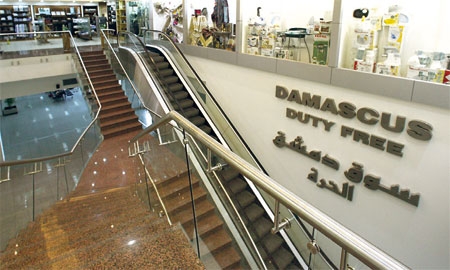First impressions count. Therefore, the entry and exit points of a country are uniquely placed to enhance the image of a country in the minds of tourists and business travelers in transit by not only offering a warm welcome, but also a fond farewell. With more than 8.5 million tourists visiting Syria in 2010 and that number expected to rise year-on-year, the facilities and services available at Syria’s gateways represent an important opportunity to help raise the nation’s profile internationally.
“It is important that tourists visiting Syria feel welcome from their arrival at the borders, whether that be land, sea or air entry points,” says Ehab Makhlouf, president of Syria Duty Free. “There are plans today to expand or improve most gateways to accommodate the rising number of travelers; for example Damascus international airport has now reached its full capacity and there are plans to expand it. Syria Duty Free will certainly take this opportunity to also expand its business and open new shops.”
At the beginning of 2010, Syria Duty Free completed the acquisition of RAMAK Duty Free Shops. RAMAK was the first Syrian private company in the field of travel retail, starting its activities in 1997 when it first opened Damascus Duty Free Shop at Damascus International Airport.
Today, Syria Duty Free employs 1,500 people and operates seven duty-free shops across Syria, with premises at Damascus and Aleppo International airports, Lattakia and Tartous seaports, and on the borders of Lebanon, Jordan and Turkey.
‘OUR SHOPS SURPASS THE MOST MODERN AND SOPHISTICATED OUTLETS YOU‘LL FIND ANYWHERE IN THE WORLD’
|
“We invested time and energy in setting high standards at every gateway around Syria,” says Mr. Makhlouf. “That work is now paying off with the increasing flow of tourists. One of our major investments was to set up a quality management system that allowed us to streamline all our operations and to become, in 2009, the first duty-free shop in the world certified to ISO 9001-2008 standard by Lloyd’s Register Quality Assurance.”
The company has an expansion strategy that will see it open additional shops along the 500-mile-long Syrian-Turkish border as links with Turkey continue to strengthen. The duty-free chain also has plans for premises on Lebanon’s northern border with Syria, as traffic on the coastal side for both countries is rising.
“Maintaining the highest level of customer satisfaction is our first priority,” says Mr. Makhlouf. “We have a special unit to study and respond to our customers’ demands, and we have installed a unique system in our shops that allows customers to provide real-time feedback to management, which enables us to respond quickly to the issues they raise.”
The company’s second objective is to always offer the highest quality of international brand names, products and services at the lowest prices. “If you compare our outlets with other duty-free shops in the region, you will find that we have hit that target,” says the president.
“Our shops surpass the most modern and sophisticated outlets you‘ll find anywhere in the world. The reviews speak for themselves. All our suppliers are astonished by what they see in our stores and state that we are comparable if not exceed what one can find at the border between the USA and Canada. This is the level of quality and service we have.
“Our customers have commented on the professionalism of our staff, the friendly environment, the architecture and designs of the shops and the wide range of products available,” says Mr. Makhlouf.
Hotel accommodation, food services and even children playgrounds are available at some of the shops. The Damascus Duty Free shop, for example, on the second floor of the airport, offers a wide range of goods including tobacco, liquor, perfume, electronics, watches, confectionery, jewelry, travel goods, fashion, toys and crystal items.
“Despite international and regional pressures, Syria was successful in gradually and sustainably transforming its economic system from a state-run economy to an open market style. This transformation was beneficial to all Syrians,” says Mr. Makhlouf. “President Bashar al-Assad has done a remarkable job in expanding, modernizing and reforming the system to a more functional, flexible and adapted economic model. The carefully moderated transformation to today’s social market economy resulted in a package of developments that are easily observed, such as the opening of new industrial cities across the country, attracting banks, insurance and financing investments and opening the Damascus Securities Exchange, to name but a few.”
Mr. Makhlouf also notes: “Syria has an important geopolitical position in the region as it is a conjunction point for five seas: Caspian, Black, Mediterranean, Red and the Gulf. Our aspiration as a duty-free operator is to be one of the major players in the travel retail industry for that region.”

0 COMMENTS